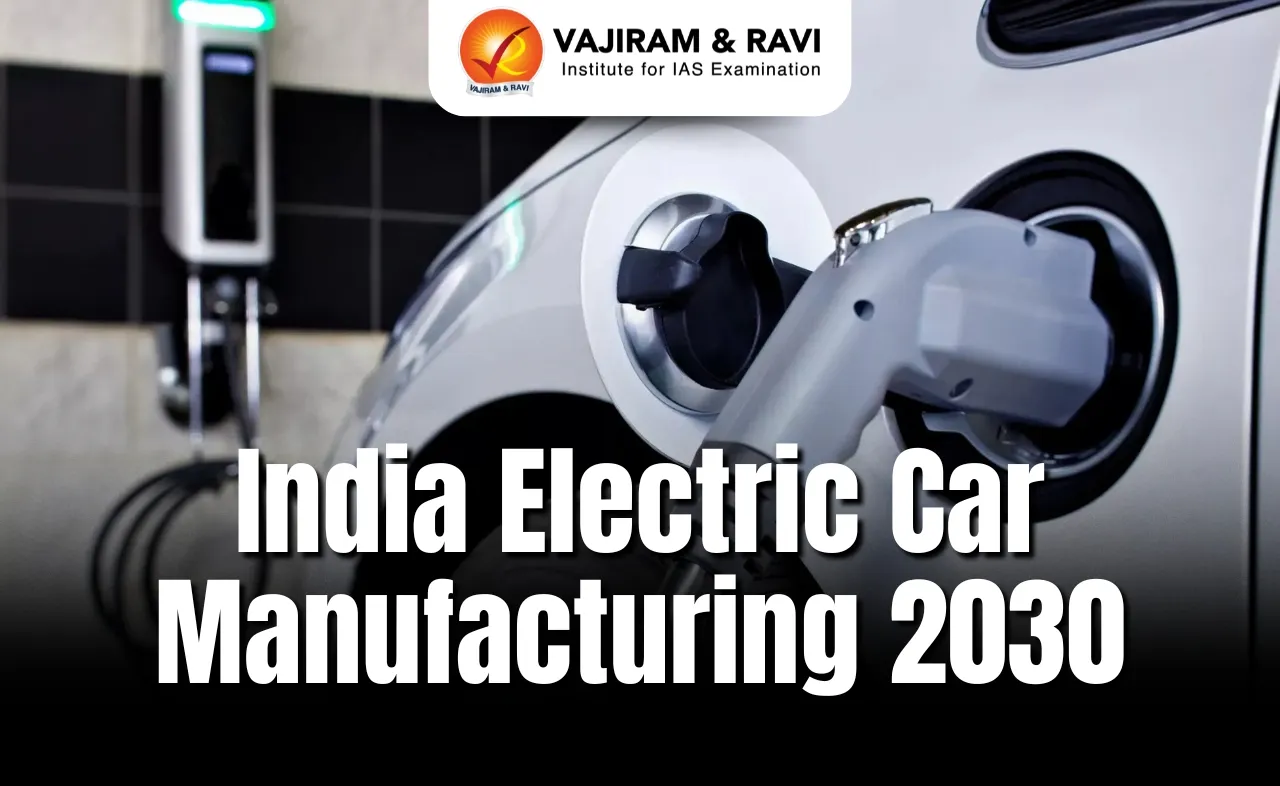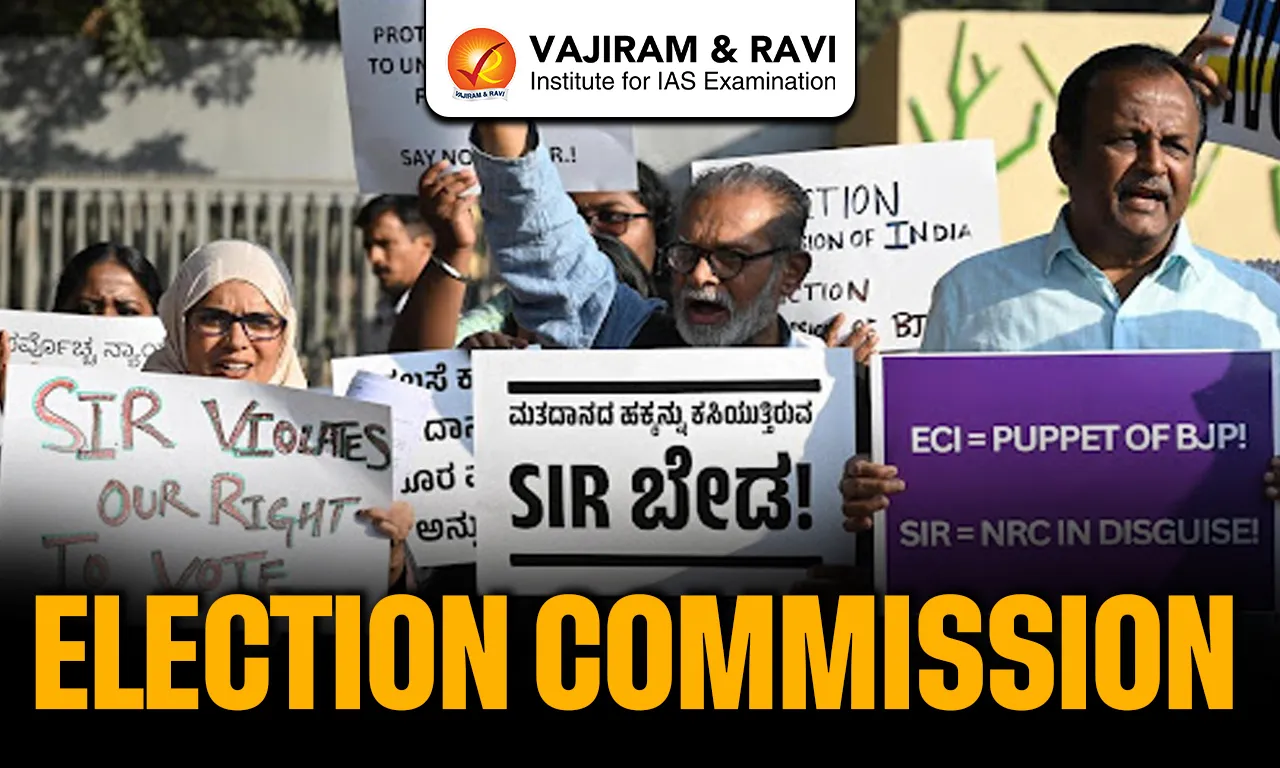India Electric Car Manufacturing Latest News
India’s planned electric four-wheeler manufacturing capacity is set to rise over tenfold to 2.5 million, according to new research by Rhodium Group.
India’s Rapid Expansion in Electric Vehicle Manufacturing
- India is poised to make a major leap in the global electric vehicle (EV) manufacturing race.
- According to a report by the Rhodium Group, the country is expected to become the fourth-largest electric car manufacturer in the world by 2030, trailing only China, the European Union, and the United States.
- This shift is driven by a significant scale-up in EV production capacity, proactive government policies, and strategic protectionist measures to support domestic players.
- India’s electric four-wheeler manufacturing capacity is projected to rise over tenfold from the current 0.2 million units to 2.5 million units by 2030.
- This makes it one of the fastest-growing EV manufacturing hubs globally.
Projected Supply Surplus and Export Opportunities
- The Rhodium report estimates that India’s EV production capacity will exceed domestic demand by 1.1 to 2.1 million units between now and 2030.
- While domestic EV demand is expected to grow to between 0.4 to 1.4 million units by the end of the decade, this still falls short of the planned production capacity.
- This projected surplus opens up potential for India to emerge as a key EV exporter, provided that it can lower manufacturing costs and compete globally, especially against Chinese exports, which currently dominate global EV markets.
Role of Domestic Players and Current Market Share
- Indian automakers such as Tata Motors, MG Motor, and Mahindra have consolidated their dominance in the domestic market.
- These three accounted for nearly 90% of India’s electric car sales in 2024-25, according to the Vahan dashboard.
- Despite low current EV penetration, just 2% in 2024, the Rhodium report notes that India has outpaced countries like Japan and South Korea in terms of future manufacturing capacity, driven by planned investments and supportive policies.
Policy Framework and Industrial Strategy
- India’s rise in the EV space is strongly supported by a combination of industrial policy, market incentives, and a protectionist trade strategy. Key elements of this approach include:
- Consumer Subsidies: Linked to increasing localisation requirements, these subsidies aim to reduce dependency on imports and incentivise domestic manufacturing.
- Production-Linked Incentives (PLI): Schemes for advanced battery manufacturing and EV component production have catalysed investment.
- Tariffs: Import duties of 70–100% on fully built electric vehicles have shielded Indian manufacturers from foreign competition, enabling the domestic industry to scale up.
- Infrastructure Expansion: A concerted push to expand EV charging infrastructure supports long-term adoption goals.
- While these measures have helped boost local manufacturing, the Rhodium report cautions that they have also raised consumer costs and limited product variety.
Battery Manufacturing: Strengths and Gaps
- India is rapidly establishing itself as a significant player in the battery manufacturing ecosystem.
- According to the report, the country is set to become the largest EV battery module producer outside China, Europe, and the United States, with substantial capacity under construction or newly announced.
- However, the majority of this projected growth depends on projects that are still in development, making timely execution a critical factor.
- On the cell production front, India is expected to surpass countries like South Korea, Malaysia, and Japan by 2030, but it will still lag behind China, the US, Europe, and Canada.
- China is projected to lead with a cell manufacturing capacity of 4,818 GWh, followed by the US (1,169 GWh), Europe (997 GWh), and India grouped with others at 567 GWh.
Comparative Global Position
- India’s anticipated production capacity of 2.5 million electric cars will be behind:
- China: 29 million units
- EU: 9 million units
- USA: 6 million units
- However, it is expected to surpass Japan (1.4 million units) and South Korea (1.9 million units), which currently have greater operational capacities but limited future expansion plans.
Conclusion
- India’s electric car manufacturing ecosystem is undergoing a transformative expansion.
- By aligning industrial policy with ambitious localisation and export goals, India is well-positioned to become a global EV hub.
- The country’s success in this sector will ultimately depend on its ability to manage production efficiency, meet delivery timelines for battery projects, and remain competitive on the global stage against major players like China.
Last updated on February, 2026
→ UPSC Notification 2026 is now out on the official website at upsconline.nic.in.
→ UPSC IFoS Notification 2026 is now out on the official website at upsconline.nic.in.
→ UPSC Calendar 2026 has been released.
→ UPSC Final Result 2025 is expected to be released in the second week of April 2026.
→ Check out the latest UPSC Syllabus 2026 here.
→ Join Vajiram & Ravi’s Interview Guidance Programme for expert help to crack your final UPSC stage.
→ UPSC Mains Result 2025 is now out.
→ UPSC Prelims 2026 will be conducted on 24th May, 2026 & UPSC Mains 2026 will be conducted on 21st August 2026.
→ The UPSC Selection Process is of 3 stages-Prelims, Mains and Interview.
→ Prepare effectively with Vajiram & Ravi’s UPSC Prelims Test Series 2026 featuring full-length mock tests, detailed solutions, and performance analysis.
→ Enroll in Vajiram & Ravi’s UPSC Mains Test Series 2026 for structured answer writing practice, expert evaluation, and exam-oriented feedback.
→ Join Vajiram & Ravi’s Best UPSC Mentorship Program for personalized guidance, strategy planning, and one-to-one support from experienced mentors.
→ Check UPSC Marksheet 2024 Here.
→ UPSC Toppers List 2024 is released now. Shakti Dubey is UPSC AIR 1 2024 Topper.
→ Also check Best UPSC Coaching in India
India Electric Car Manufacturing FAQs
Q1. What is India’s projected electric car manufacturing capacity by 2030?+
Q2. How does India rank globally in projected electric vehicle manufacturing?+
Q3. What challenges must India overcome to become a global EV exporter?+
Q4. Which Indian companies currently lead in the domestic EV market?+
Q5. How is the Indian government supporting EV manufacturing?+
Tags: india electric car manufacturing mains articles upsc current affairs upsc mains current affairs




















